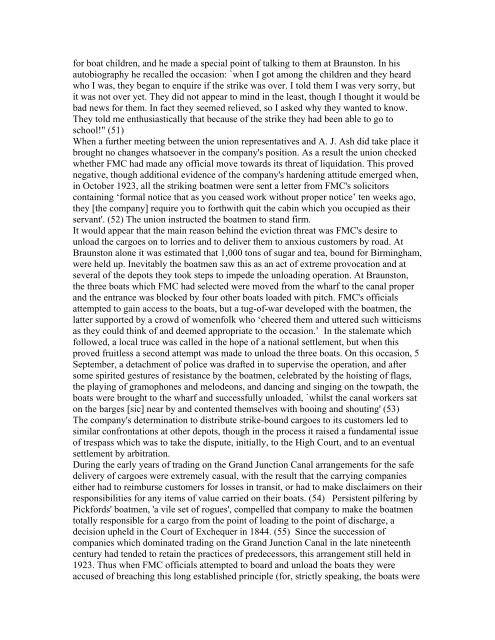The canal boatmen's strike of 1923 - The History of The Narrow Boat ...
The canal boatmen's strike of 1923 - The History of The Narrow Boat ...
The canal boatmen's strike of 1923 - The History of The Narrow Boat ...
Create successful ePaper yourself
Turn your PDF publications into a flip-book with our unique Google optimized e-Paper software.
for boat children, and he made a special point <strong>of</strong> talking to them at Braunston. In his<br />
autobiography he recalled the occasion: `when I got among the children and they heard<br />
who I was, they began to enquire if the <strong>strike</strong> was over. I told them I was very sorry, but<br />
it was not over yet. <strong>The</strong>y did not appear to mind in the least, though I thought it would be<br />
bad news for them. In fact they seemed relieved, so I asked why they wanted to know.<br />
<strong>The</strong>y told me enthusiastically that because <strong>of</strong> the <strong>strike</strong> they had been able to go to<br />
school!" (51)<br />
When a further meeting between the union representatives and A. J. Ash did take place it<br />
brought no changes whatsoever in the company's position. As a result the union checked<br />
whether FMC had made any <strong>of</strong>ficial move towards its threat <strong>of</strong> liquidation. This proved<br />
negative, though additional evidence <strong>of</strong> the company's hardening attitude emerged when,<br />
in October <strong>1923</strong>, all the striking boatmen were sent a letter from FMC's solicitors<br />
containing ‘formal notice that as you ceased work without proper notice’ ten weeks ago,<br />
they [the company] require you to forthwith quit the cabin which you occupied as their<br />
servant'. (52) <strong>The</strong> union instructed the boatmen to stand firm.<br />
It would appear that the main reason behind the eviction threat was FMC's desire to<br />
unload the cargoes on to lorries and to deliver them to anxious customers by road. At<br />
Braunston alone it was estimated that 1,000 tons <strong>of</strong> sugar and tea, bound for Birmingham,<br />
were held up. Inevitably the boatmen saw this as an act <strong>of</strong> extreme provocation and at<br />
several <strong>of</strong> the depots they took steps to impede the unloading operation. At Braunston,<br />
the three boats which FMC had selected were moved from the wharf to the <strong>canal</strong> proper<br />
and the entrance was blocked by four other boats loaded with pitch. FMC's <strong>of</strong>ficials<br />
attempted to gain access to the boats, but a tug-<strong>of</strong>-war developed with the boatmen, the<br />
latter supported by a crowd <strong>of</strong> womenfolk who ‘cheered them and uttered such witticisms<br />
as they could think <strong>of</strong> and deemed appropriate to the occasion.’ In the stalemate which<br />
followed, a local truce was called in the hope <strong>of</strong> a national settlement, but when this<br />
proved fruitless a second attempt was made to unload the three boats. On this occasion, 5<br />
September, a detachment <strong>of</strong> police was drafted in to supervise the operation, and after<br />
some spirited gestures <strong>of</strong> resistance by the boatmen, celebrated by the hoisting <strong>of</strong> flags,<br />
the playing <strong>of</strong> gramophones and melodeons, and dancing and singing on the towpath, the<br />
boats were brought to the wharf and successfully unloaded, `whilst the <strong>canal</strong> workers sat<br />
on the barges [sic] near by and contented themselves with booing and shouting' (53)<br />
<strong>The</strong> company's determination to distribute <strong>strike</strong>-bound cargoes to its customers led to<br />
similar confrontations at other depots, though in the process it raised a fundamental issue<br />
<strong>of</strong> trespass which was to take the dispute, initially, to the High Court, and to an eventual<br />
settlement by arbitration.<br />
During the early years <strong>of</strong> trading on the Grand Junction Canal arrangements for the safe<br />
delivery <strong>of</strong> cargoes were extremely casual, with the result that the carrying companies<br />
either had to reimburse customers for losses in transit, or had to make disclaimers on their<br />
responsibilities for any items <strong>of</strong> value carried on their boats. (54) Persistent pilfering by<br />
Pickfords' boatmen, 'a vile set <strong>of</strong> rogues', compelled that company to make the boatmen<br />
totally responsible for a cargo from the point <strong>of</strong> loading to the point <strong>of</strong> discharge, a<br />
decision upheld in the Court <strong>of</strong> Exchequer in 1844. (55) Since the succession <strong>of</strong><br />
companies which dominated trading on the Grand Junction Canal in the late nineteenth<br />
century had tended to retain the practices <strong>of</strong> predecessors, this arrangement still held in<br />
<strong>1923</strong>. Thus when FMC <strong>of</strong>ficials attempted to board and unload the boats they were<br />
accused <strong>of</strong> breaching this long established principle (for, strictly speaking, the boats were


